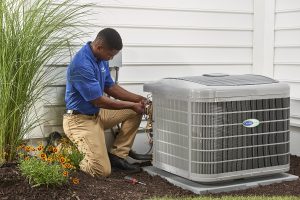Did you know an AC water leak can not only damage your unit but can also have serious consequences for your health? The components of the air conditioning system that are affected by a water leak should be checked by a certified technician at the first sign of trouble.

Understanding Your AC System
There are various types of air conditioning systems, but the basic operation is the same. An AC unit removes the warmer air and humidity from within a building and exchanges it for cooler air. The cooling effect requires the use of a refrigerant chemical that is converted from a gas to a liquid and then to a gas again.
This process is done by the unit’s compressor, which raises the temperature and pressure levels of the gas before forcing it to the condenser coil where it becomes a liquid. Once the refrigerant enters the evaporator and it returns to the interior components, the liquid evaporates and cools the coil. This coolness is dispersed throughout the home as the heated evaporator gas is directed outside. The cycle continues during the operation of the AC unit.
The Problems Caused by a Leaking Air Conditioner
A leaking AC unit can lead to irreversible damage to the air conditioner itself if not promptly addressed. It can also cause severe property damage to the home, and, most importantly, can lead to serious health conditions.
For most, regularly scheduled AC maintenance is a preventive measure to ensure the unit does not endure an issue such as a water leak. Below are some signs of a leak that indicate your air conditioner requires immediate repairs or even replacement.
Clogged Condensate Drain Line
Repair technicians often see water leaks caused by a clogged condensate drain line. Grime can block the line, forcing the water to pool and leak throughout the unit. This water can quickly back up and drain into the interior of the home or office.
Dirty Air Filter
An air conditioner’s air filters are designed to capture dirt, dust, and debris from settling onto the interior components of the unit. Dirty filters lower the airflow, making the AC work harder. This can lead to the evaporator coil freezing and melting, producing a water leak.
Low Refrigerant Levels
When the refrigerant level lowers to a dangerous level, it can negatively affect the air conditioner, not to mention pose the risk of poisonous gas being released into the air. Low refrigerant can see reduced pressure in the unit and can cause the evaporator coils to freeze.
Damaged Overflow Pan
A common cause of a water leak in an air conditioning unit is the use of a damaged or old drain overflow pan. A cracked or damaged pan can see a water leak, preventing outflow through the hose.
Preventing Air Conditioner Water Leaks
There are helpful tips to prevent an air conditioner from leaking water. It is vital to check for any condensate buildup, maintain a field of security to prevent animals from nearing the outdoor unit, ensure the drip pan is mounted properly, and have an annual maintenance check by a professional.
One little-known fact about an AC system is that it can actually be too cold outside to operate efficiently. It is recommended not to use an air conditioner when the outdoor temperatures hover below 18 degrees Celsius. This can cause condensation to freeze the coils.
When to Call a Professional
As AC repair and maintenance are essential to the overall condition of the unit, it is highly recommended to have a professional manage all your concerns. Choose a reputable HVAC team with the North American Technician Excellence (NATE) certification as members receive the highest standards of training and skill development.
A professional will have years of experience, faster and more efficient service, money-saving options, and promise to get the job right the first time.
Contact Econoair Heating & Cooling Inc. for AC Maintenance and Repair Needs
Don’t wait until the sweltering heat of the summer begins. Contact Econoair Heating & Cooling Inc. for your AC installation today! With a variety of maintenance and repair programs, we offer a 7-point Safety Check performed by one of our certified and trained technicians. We also provide a 24/7 contact center through 905-763-2400 or through our form here. Contact us today for all your questions.
